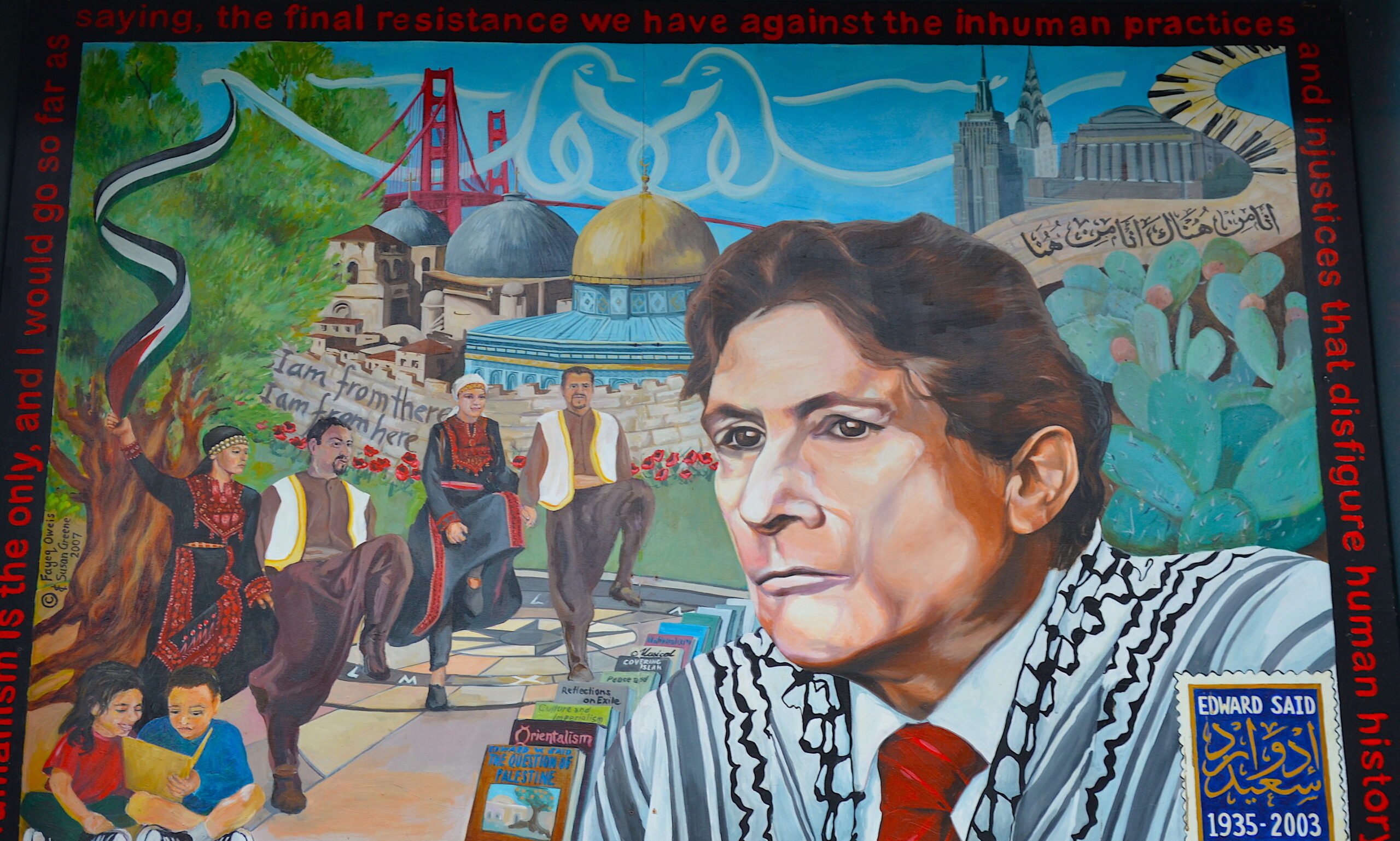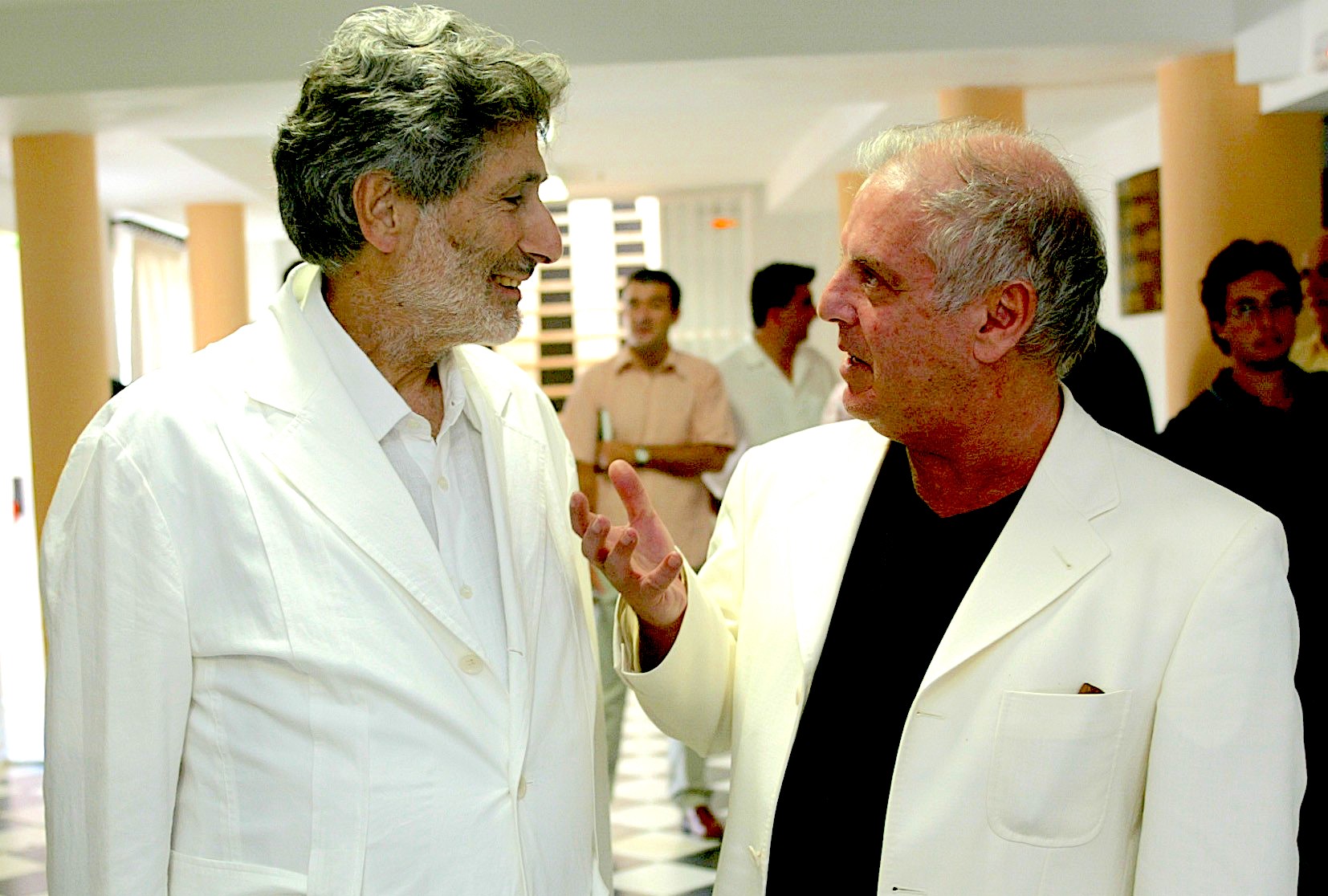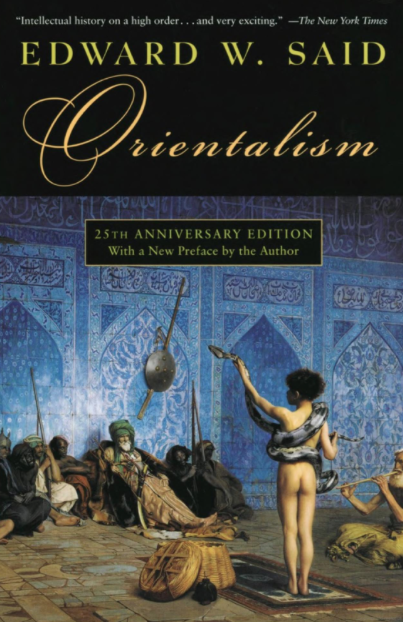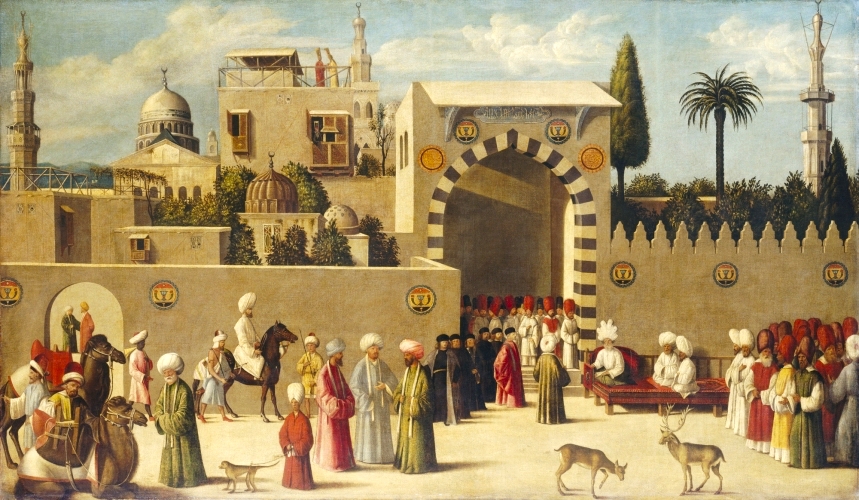Lawrence Davidson responds to Caroline Glick’s tirade, picked up by Newsweek, against the late American-Palestinian scholar.

Palestinian cultural mural honoring Edward Said. (Briantrejo, CC BY-SA 3.0, Wikimedia Commons)
By Lawrence Davidson
TothePointAnalysis.com
 I traveled to Israel and the Occupied Territories in the early 2000s with the progressive group Faculty for Israeli-Palestinian Peace. We made an effort to gain insight into most of the players in the conflict, and so a series of interviews was arranged with members of the Israeli right wing. I remember that one of them was Caroline Glick, an ardent American-Israeli Zionist. She lectured us on the positive personal relationships allegedly prevalent between Israeli Jews and Palestinians.
I traveled to Israel and the Occupied Territories in the early 2000s with the progressive group Faculty for Israeli-Palestinian Peace. We made an effort to gain insight into most of the players in the conflict, and so a series of interviews was arranged with members of the Israeli right wing. I remember that one of them was Caroline Glick, an ardent American-Israeli Zionist. She lectured us on the positive personal relationships allegedly prevalent between Israeli Jews and Palestinians.
It was an interesting and somewhat embarrassing experience. Glick and I are both American and both Jewish. Growing up, I had this understanding that American plus Jewish always meant being anti-racist. To be so was, in my mind, the prime lesson of modern Jewish history. What being anti-racist meant to Glick was unclear.
She spent the better part of an hour giving us a defense of Israeli-Jewish treatment of Palestinians based on the classic “some of my best friends are black” (read Palestinian) defense. In the words of New York Times journalist John Eligon, this line of argument “has so often been relied on by those facing accusations of racism that it has become shorthand for weak denials of bigotry — a punch line about the absence of thoughtfulness and rigor in our conversations about racism.”
And so, it was with Glick, who explained that she, and many other Israeli Jews, had Palestinians who do small jobs for them and are treated well, and that this proves a lack of cultural and societal racism. It was such a vacuous argument that I remember feeling embarrassed for her.
Things haven’t gotten much better when it comes to Glick’s worldview. She is now a senior columnist at Israel Hayom (Israel Today, a pro-Netanyahu newspaper owned by the family of Sheldon Adelson) and contributor to such questionable U.S. outlets as Breitbart News. She also directs the Israeli Security Project at the David Horowitz Freedom Center. There can be little doubt that she continues to see the world through the distorting lens of a particularly hardline variant of Zionism.
Glick’s Attack on Edward Said’s Legacy

Caroline Glick. (From her Twitter account)
Recently, Caroline Glick launched an attack on the legacy of the late American-Palestinian scholar and teacher Edward Said. Entitled “Edward Said, Prophet of Political Violence in America,” it was published on July 7 in the U.S. by Newsweek — a news magazine with an increasingly pro-Zionist editorial stand.
As it turns out, one cannot find a better example of how ideology can distort one’s outlook to the point of absurdity. Below is an analysis of Glick’s piece in a point-by-point fashion. Ultimately, the ideological basis for her argument will become clear.
- Glick begins by resurrecting a 20-year-old event. “On July 3, 2000, an incident occurred along the Lebanese border with Israel that, at the time, seemed both bizarre and … unimportant. That day, Columbia University professor Edward Said was photographed on the Hezbollah-controlled Lebanese side of the border with Israel throwing a rock at an Israel Defense Forces watchtower 30 feet away.” She goes on to describe this act as “Said’s rock attack on Israel” and the “soldiers protecting their border.”
We need some context to put all of this in perspective: Israel is an expansionist state, and the original Zionist aim (as presented to the Paris Peace Conference following World War I) was to incorporate parts of southern Lebanon into what is now Israel. Southern Lebanon also briefly became a staging area for Palestinian retaliatory attacks into Israel. Thus, Israel invaded Lebanon multiple times only to be forced to withdraw in the face of resistance led by Hezbollah, a strong Lebanese Shiite militia in control of much of southern Lebanon.

Edward Said, at left, with Daniel Barenboim in 2002. (Akademie, Wikimedia Commons)
Said relates that during his 2000 visit to the Lebanese border with his family, he threw a pebble (not a “rock”) at a deserted Israeli watchtower (no Israeli soldiers were “defending their border”). Said saw this as a symbolic act of defiance against Israeli occupation. Over the years stone throwing by Palestinian youth had become just such a symbolic act. And, it was from their example that Said might have taken his cue.
- However, Glick wants to draw highly questionable consequences from Said’s act. She tells us that “with the hindsight of 20 years, it was a seminal moment and a harbinger for the mob violence now taking place in many parts of America.” By the way, the “mob violence” in America she is referring to is the mass protests against police brutality that followed the murder of George Floyd by Minneapolis police on May 25, 2020.

George Floyd protests against police violence, Minneapolis, May 28, 2020. (Fibonacci Blue, Flickr)
- Now that sounds a bit odd. How does Glick manage this segue from Edward Said’s symbolic stone toss in the year 2000 to nationwide inner-city rebellions against police brutality in 2020 America? Here is the contorted sequence she offers:a) Said was a terrorist because he was an influential member of the alleged “terrorist organization,” the Palestinian Liberation Organization (PLO). “Terrorist organization” is a standard Zionist descriptor of most Palestinian organizations. Actually, the PLO is the legally recognized representative of the Palestinian people and as such has carried on both an armed and a diplomatic struggle to liberate Palestine from Israeli Occupation. In 1993, the PLO recognized Israel’s right to exist. This made little difference to the Zionist right wing who, like Glick, continued to use the terrorist tag for propaganda purposes. It is to be noted that all liberation movements are considered to be “terrorist” by those they fight against. And, indeed both sides in such a struggle usually act in this fashion on occasion. Certainly, Israel is no innocent in this regard.b) For Glick, Said’s alleged terrorist connection transforms his “rock attack” into a terrorist act. This is simply an ad hominem assertion on Glick’s part. There is no evidence that Said ever engaged in any act, including the tossing of stones, that can sanely be characterized as terrorism.
c) Glick tells us that, at the same time Said was “committing a terrorist attack” on Israel, he was also “the superstar of far-Left intellectuals.” It is hard to know what she means here by “far-Left.” It seems to be another ad hominem slander. Said was a scholar of comparative literature and, when not in the classroom, he advocated for the political and human rights of oppressed Palestinians — how “far-Left” is that?
d) Nonetheless, Glick goes on to assert that as a “far-Left” academic, Said waged a “nihilistic” and “anti-intellectual” offensive against Western thought. He did so in a well-known work entitled “Orientalism”published in 1978. What does “Orientalism” actually say? Using mostly 19th century literary and artistic examples, the book documents the prevailing Western perception of the Near East and North Africa, which stands in for the Orient. This perception reflects a basically bipolar worldview — one which, according to Said, reserved for the West a superior image of science and reason, prosperity and high culture, and for the Orient an inferior somewhat mysterious and effeminate image of the “other” fated for domination by the West. Over time this view became pervasive in the West and influenced not only literary and artistic views of the Orient, but also impacted political, historical, anthropological and other non-fictional interpretations. Having helped create a superior sense of self, this orientalist perception served as a rationale for Western world dominance. It should be said that whether one agrees with every one of Said’s details or not, there is no doubt his well- researched and documented work has made most scholars more aware of their biases.
What does “Orientalism” actually say? Using mostly 19th century literary and artistic examples, the book documents the prevailing Western perception of the Near East and North Africa, which stands in for the Orient. This perception reflects a basically bipolar worldview — one which, according to Said, reserved for the West a superior image of science and reason, prosperity and high culture, and for the Orient an inferior somewhat mysterious and effeminate image of the “other” fated for domination by the West. Over time this view became pervasive in the West and influenced not only literary and artistic views of the Orient, but also impacted political, historical, anthropological and other non-fictional interpretations. Having helped create a superior sense of self, this orientalist perception served as a rationale for Western world dominance. It should be said that whether one agrees with every one of Said’s details or not, there is no doubt his well- researched and documented work has made most scholars more aware of their biases.
e) Glick refuses to see “Orientalism” as just an influential academic work. Instead, in what appears to be a pattern of illogical jumps, she claims that “in Orientalism, Said characterized all Western — and particularly American — scholarship on the Arab and Islamic worlds as one big conspiracy theory” designed to justify empire. This then is the heart of Said’s alleged “nihilistic” repudiation of Western scholarship. She particularly points to Said’s claim that “From the Enlightenment period through the present every European, in what he could say about the Orient, was a racist, an imperialist and almost totally ethnocentric.” While this is a far-reaching generalization, it basically reflects an equally pervasive, very real Western cultural bias. What Glick describes as a “conspiracy theory” is Said’s scholarly demonstration of how that bias has expressed itself. And, it should be noted that such pervasive biases are not uniquely American nor even Western. Chinese, Japanese, Arab/Muslim, Hindu and Jewish civilizations have their own variants of such biases. Yet, it is Said’s effort to expose and ameliorate the Orientalism of the West that seems to madden Caroline Glick.
f) For Glick, Said’s suggestion that both past as well as many present scholars have culturally biased points of view of the Orient becomes an accusation that any “great scholar” with a classical Western worldview “is worse than worthless. If he is a white American, he is an agent of evil.” Glick is now building a real head of steam and her account becomes more and more grotesque. She now claims that Said’s work is “intellectual nihilism.” How so? Because it “champions narrative over evidence.” What Glick is implying here is that Said’s work is an anti-Western screed presented without evidence. This is demonstrably wrong, but nonetheless provides a platform for Glick’s further assertion that Said’s fantastical narrative is told in order to “manipulate students to engage in political violence against the United States.”
What Is This All About?

Israel Hayom readers in Jerusalem, 2011. (Adam Jones, CC BY-SA 2.0, Wikimedia Commons)
Caroline Glick makes repeated illogical jumps. As egregious as these are, they actually point the way to her larger ideological agenda.
- Said is a terrorist because he opposes Israel and supports the Palestinians. Participation in the PLO is her proof of this.
- Because Said is a terrorist, his throwing of a stone at the southern Lebanese border is a terrorist attack against Israel and its defense forces.
- Somehow, Said’s throwing the stone was also “a harbinger for the mob violence now taking place in many parts of America.” The connector here is Said’stossing of an intellectual “rock” — his thesis presented in “Orientalism.”
- Just as his “rock attack” was terroristic, so Said’s book, “Orientalism,” is itself an act of terrorism as well as a “nihilistic” project.
- It is all these nasty things rolled into one because it calls into question established cultural assumptions that had long underpinned colonialism and imperialism, and which also just happens to underpin Israel’s claim to legitimacy.
- But there is more. Glick tells us, “Said’s championing of the Palestinian war against Israel was part of a far wider post-colonialist crusade he waged against the United States. The purpose of his scholarship was to deny American professors the right to study and understand the world [in an orientalist fashion] by delegitimizing them as nothing but racists and imperialists.”
- And finally, “Orientalismformed the foundation of a much broader campaign on campuses to delegitimize the United States as a political entity steeped in racism.”
Turning Back the Clock

Venetian orientalist painting, “The Reception of the Ambassadors in Damascus,” 1511, by Giovanni di Niccolò Mansueti, Musée du Louvre. (Anonymous Venetian, Wikimedia Commons)
Glick’s attack on Edward Said’s legacy is beset with leaps of illogic. So, let me conclude this analysis with my own leap, hopefully a logical one, to an explanation of what may be Glick’s larger agenda. Glick is attempting to turn the ideological clock back to a time before decolonization. Specifically, she wishes to resurrect an overall acceptance of Western colonialism as a benevolent endeavor whereby progress and civilization was spread by a superior culture.
Why would she want to do this? Because if we all believe this proposition, then Israel can be seen as a legitimate and normal state. After all, Israel is the last of the colonial settler states — the imposition of Western culture into the Orient. It rules over millions of Palestinian Arabs as the result of a European invasion made “legal” by a colonial document, the Balfour Declaration, and its acceptance by a pro-colonial League of Nations. Our post-colonial age in which Edward Said is a “superstar intellectual,” is seen as a constant threat to Zionist Israel’s legitimacy.
Edward Said’s legacy provides a strong theoretical foundation for understanding why the Western imperialists thought and acted as they did, and hence helps both Western and non-Western peoples to confront their own modern historical situation. However, Glick cannot see any of this except through the Zionist perspective. Thus, Said’s legacy is just part of an anti-Israeli conspiracy — an attack on those scholars who support the legitimacy of an orientalist point of view and of the Zionist state.
She also suggests that Said’s undoing of historically accepted biases lets loose the “mob violence” seen in the U.S. There is no evidence for this, but it may be Glick’s roundabout way of undermining student support for Palestinian rights on American campuses.
Ultimately, what Glick is interested in is preserving the image of Israel as a Western democratic enclave in an otherwise uncivilized sea of Arab and Islamic barbarians. That fits right into the traditional orientalist belief system and justifies the continuing U.S.-Israeli alliance. Said has successfully called that perspective into question. Hence Glick’s assault on his legacy.
Finally, Glick’s present attack on Said, and her attempt to tie his work into the protests that followed George Floyd’s murder, shows how frightened the defenders of one racist state, Zionist Israel, become when their principle ally, the United States, comes under attack for racist practices. Said as a “superstar” foe of all racism becomes the lightning rod for that fear.
Lawrence Davidson is professor of history emeritus at West Chester University in Pennsylvania. He has been publishing his analyses of topics in U.S. domestic and foreign policy, international and humanitarian law and Israel/Zionist practices and policies since 2010.
This article is from his site, TothePointAnalysis.com.
The views expressed are solely those of the author and may or may not reflect those of Consortium News.
Please Contribute to Consortium
News on its 25th Anniversary
Donate securely with  PayPal here.
PayPal here.
Or securely by credit card or check by clicking the red button:

And, one needs to add that Edward Said died almost seventeen years ago, and is therefore not here to defend himself from attack, although experience suggests that Said himself would have found little need to defend against such a goofy and hare-brained assault on both logic and history.
Glick’s an apologist and propagandist for a protofascist Israeli state, methinks, and the need for enemies, even dead ones, is paramount in that benighted cause. How else can the right-wing Israelis continue to portray themselves as victims, set upon by dangerous symbolic rock-throwers when all they have to defend themselves are Hellfire missiles, JDAMs and nuclear weapons?
Indeed, the dead are dangerous.
Just had a look at the Newsweek article in question and I was happy to see that the vast majority of comments on Glick’s article were highly critical. It is encouraging to see that so many readers were not fooled by her arguments, and that the comments were allowed to stand rather than being censored.
Mr. Davidson’s article is a rare and valuable series of Truths in this Era of the Big !ie. it provides only edification and hope; it doesn’t pander to our (America’s) pervasive Exceptionalism.
While I fully agree that the zionists have done the slave and master inversion so far as Palestine is concerned, I come from a different place. In doing research for a book on Islamic history, I occasionally came across Said’s comments and writing. Much as he was a justified hero in contemporary Palestinian rights and Israel’s turn to fascism, he didn’t know much about Islam’s history nor their historical beliefs, unfortunately..
You’ll be preferring the Bernard Lewis school of Islamic history then.
kudos peter. That is right.
Very well written and well argued. I was prepared to be convinced, but am more convinced than I thought I would be.
Good work.
I was struck how here in Australias own back yard we have our own Occupied Territories “legitimised” by the UN in West Papua, a melanesian invaded and annexed by Indonesia. Same racist premise, same violence, same cowardly western complicity.
Glick provides the world with yet another example of the absurdities of intense ideologues defending Israel’s bloody excesses.
Referring to Edward Said – a fine, gentle, humane man of exceptional intellectual ability – in terms of terrorism is just stone stupid.
It is comparable in its angry blindness to the line, “There’s no such thing as a Palestinian,” first uttered by Golda Meir and repeated occasionally by some American politicians looking for a large campaign-finance handout.
Or, even worse, with the recent past events of Israel ambushing from behind a fence unarmed people in Gaza demonstrating for some basic rights. Its brave army killed more than two hundred, wounded thousands, and the tally included women and children. In America, the action was characterized, unbelievably, by some as “restrained.”
Ideologues of any description are prone to dangerous fantasies and are thereby dangerous people.
This is true of all such extremists, of which there are many in American society itself.
Israel is built on the same sense of “exceptionalism” as the American empire is. Indeed, it is really just part of it.
Thanks for including the photo of Edward Said with Daniel Barenboim, a man of principle and one of my favorite pianists.
The first thought that popped into my mind reading Erickson’s piece was that infamous claim by Golda Meir that “there is no such thing as a Palestinian”. That also brought immediately into my mind is Joan Peters book (which was then extensively plagiarized by Alan Derskowitz) that made the “historic” case for the non-existence of a Palestinian people.
I am shamed to admit that 30 years ago I held all three of these cretins of Zionist colonialism as legitimate voices for the rights of the Jews.
It’s important to keep in mind the lessons from history in times like these. During the civil rights turmoil of the late 60’s, a charismatic person emerged calling for racial equality and attracting many thousands of followers and the support of “progressive” politicians, including Jerry Brown – his name was Jim Jones. We all must be vigilant for these types that are a ‘wolf in sheep’s clothing’ in times like these with BLM movement and the disturbing racism of Israel. Imagine how bizarre it would be for a tortured Palestinian to hear a speech by an American politician on the left supposedly, pretending to be an advocate for racial equality. I’m afraid that is what has happened to the Democratic Party, do the black pundits condemning the republicans even have a clue that their own heroes and candidates are guilty of the worst racism imaginable by their ardent support for Israel? What was it Dr. King said about an injustice anywhere?
Davidson’s analysis is excellent. One very minor quibble: republicans in Northern Ireland might argue that they, too, live in one of the very last, and oldest, settler colonial states, although the Good Friday Agreement (1998) allows a pretense of self-government within very restricted (and, arguably, very colonial) parameters.
Thank you Lawrence Davidson. I came to learn of scholar Edward Said thanks to what linguist Noam Chomsky said/wrote about his friend and their shared views.
Said was made a pariah just like Norman Finkelstein today for telling the truth.
Said’s words and expression were full of pain and humanity – his compassion for an oppressed people.
How could it be that the horror/fear from Hitler could be used in the background by propagandists hand in hand with the agenda of colonial powers to justify such terrible things, conflating the horror of the Second World War with perpetrating crimes.
Your analysis of Caroline Glick’s intent is IMO irrefutible to those of us who are troubled by the ugly NEOCON lies behind her words.
No amount of propaganda and lies from the aggressors in this sad tale will overcome my horror over policies that approved uprooting ancient life sustaining olive trees. Years ago Israeli soldiers went to prison rather than carry out their orders.
Israeli policy is cruel to Palestinians and therefore cruel and destructive to the soul of Israel and her people.
As Athol Fugard expressed in his play “A Lesson from Aloes”, apartheid hurts not only the victims but the perpetrators themselves who lose the benefit of friendships with people who they wrongly believe are inferior to themselves but who could enrich their lives.
As a citizen of Mandatory Palestine, Edward Said had a right established by international law to use force to resist the Israeli military’s occupation. His alleged rock thrown at an Israeli Defense Force watchtower was thus a legally privileged act of violence, not an act of terrorism.
Too often, Zionist propagandists charge “terrorism” when the targets are members of the IDF. The IDF is a legitimate target of Palestinian violence.
Glick = liar
I am interested to know if Ms. Glick is a Trump supporter. She seems to have the same intellectual depth as his Royal Orangeness.
Thank you Skip Scott. It’s rare for me to break a smile these days…but your “his Royal Orangeness” did it….